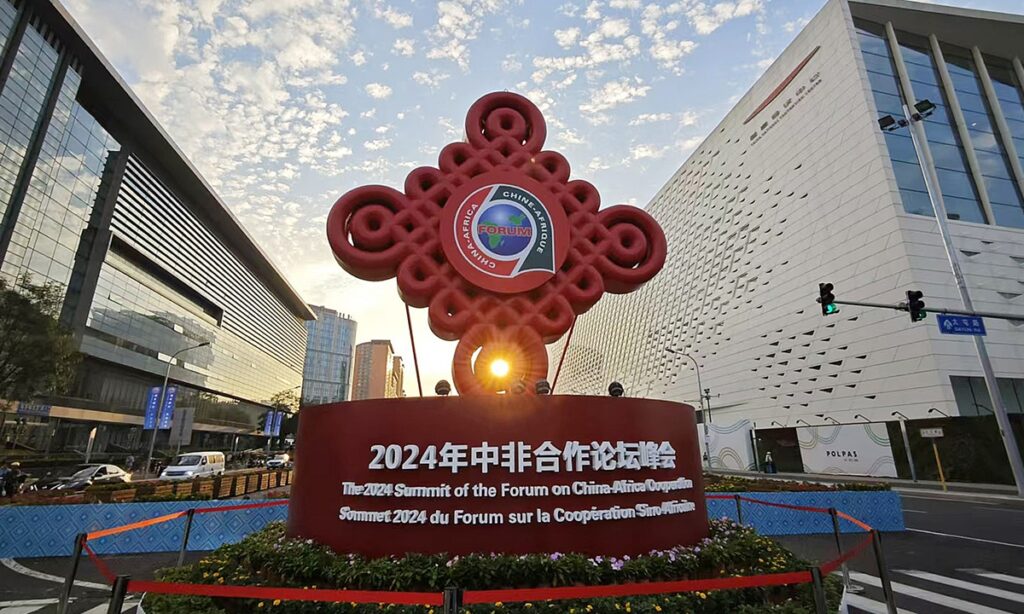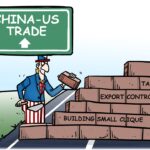A tour bus filled with travelers passed by a bustling construction site in a suburb of Tanzania’s Zanzibar, adorned with posters of Chinese companies and where Chinese engineers were busy at work. One American tourist couldn’t help but wonder: why are there so many Chinese in the local area?
That is the question that is also befuddling officials in Washington. As China and Africa have fostered closer partnership in many fields and China’s engagement in this continent becomes deeper and wider, some Western countries have started to not only smear their cooperation, but also called for competition to be stepped up with China in Africa. Such hyping and calling for competition have intensified just ahead of the 2024 Summit of Forum on China-Africa Cooperation (FOCAC).
The key distinction between China and the US in their engagement with Africa is that Beijing has taken a reciprocal and more empathetic approach, allowing it to better understand the needs of the continent and tailor its collaboration accordingly. This stands in contrast to the traditional carrot-and-stick approach used by some Western countries to coerce African nations into serving their own interests, according to experts.
This year’s FOCAC will be held in Beijing from September 4 to 6, Chinese Foreign Ministry Spokesperson Hua Chunying announced last month.
The theme of the summit is “Joining Hands to Advance Modernization and Build a High-Level China-Africa Community with a Shared Future,” Hua said, adding that leaders of FOCAC’s African members will attend the summit at the invitation of the forum.
The upcoming FOCAC summit marks another grand reunion of the China-Africa big family post-COVID pandemic, and has been hailed by Chinese and African experts as a milestone opportunity to chart the course for enhanced cooperation in the future.
Ahead of the highly-anticipated gathering, some foreign media have launched another wave of campaign hyping China’s cooperation with Africa, with reports on issues ranging from sensationalizing Chinese loans to China’s green product exports to the continent.
The National Interest, an American magazine, published an article saying that China is winning the Global South as a provider of a large amount of public goods for developing countries, including African ones.
In recent years, US officials have also called for Washington to prioritize efforts to match China’s influence among the Global South. Speaking at a Senate Foreign Relations Committee hearing last month, Ben Cardin, a Democratic senator and chair of the Senate Foreign Relations Committee, said the US needs to offer the Global South an alternative to China.
Closer cooperation
A new Gallup report released in April this year shows median approval ratings for the US in Africa slipped from 59 percent in 2022 to 56 percent in 2023. Of the four global powers surveyed, the US was the only one not to see its image improve across Africa in 2023. Meanwhile, China’s approval in the region rose six percentage points, from 52 percent in 2022 to 58 percent in 2023, two points ahead of the US.
There are vast differences in the quality of the engagement with the West, spearheaded by the US and the engagement with China, Mwangi Wachira, a former economist with the World Bank and an advisor for the Kenyan government, told the Global Times.
The Chinese engagement shows thoughtfulness. It gives us say in what we are doing, in contrast to the Western institutions, Wachira noted.
“You [China] can put yourself in my shoes…You can look at things from my perspective. Not always true from the Western side,” said Wachira.
China’s cooperation with Africa differs from the US’ in its essence. While China offers equal and mutually beneficial partnerships that contribute to the development of these nations, the US often employs a carrot-and-stick approach to coerce for support in its own interests, and treats these countries as tools in a geopolitical competition, said Song Wei, a professor from the School of International Relations and Diplomacy at Beijing Foreign Studies University.
Experts said geopolitical struggles are not what African countries want, and if the US really cares, it can find vast potential for cooperating with China on this continent, not competition, said Song.
Apart from trade, African scholars also praised China for its assistance in building infrastructure in Africa, Chinese companies’ contribution to local development and how China’s development model can present valuable insights that can guide African countries and other Global South economies in shaping a more prosperous and inclusive future.
The cooperation between Africa and China and that of Africa and the West differ mainly in how African preferences are addressed, Endalkachew Sime, PhD student at Peking University, ex-state minister of planning and development of Ethiopia and ex-secretary general of the Ethiopian Chamber of Commerce and Sectoral Associations, told the Global Times.
“For specific projects, particularly in infrastructure, African countries find that their needs and priorities are better met through Chinese cooperation. It’s not just about financing; it’s also about training and capacity building,” said Sime.
Take the companies as an example. Once Chinese companies establish operations in Africa, they hire local people, offer training skills and raise local people to the management level, said Wachira.
GT




